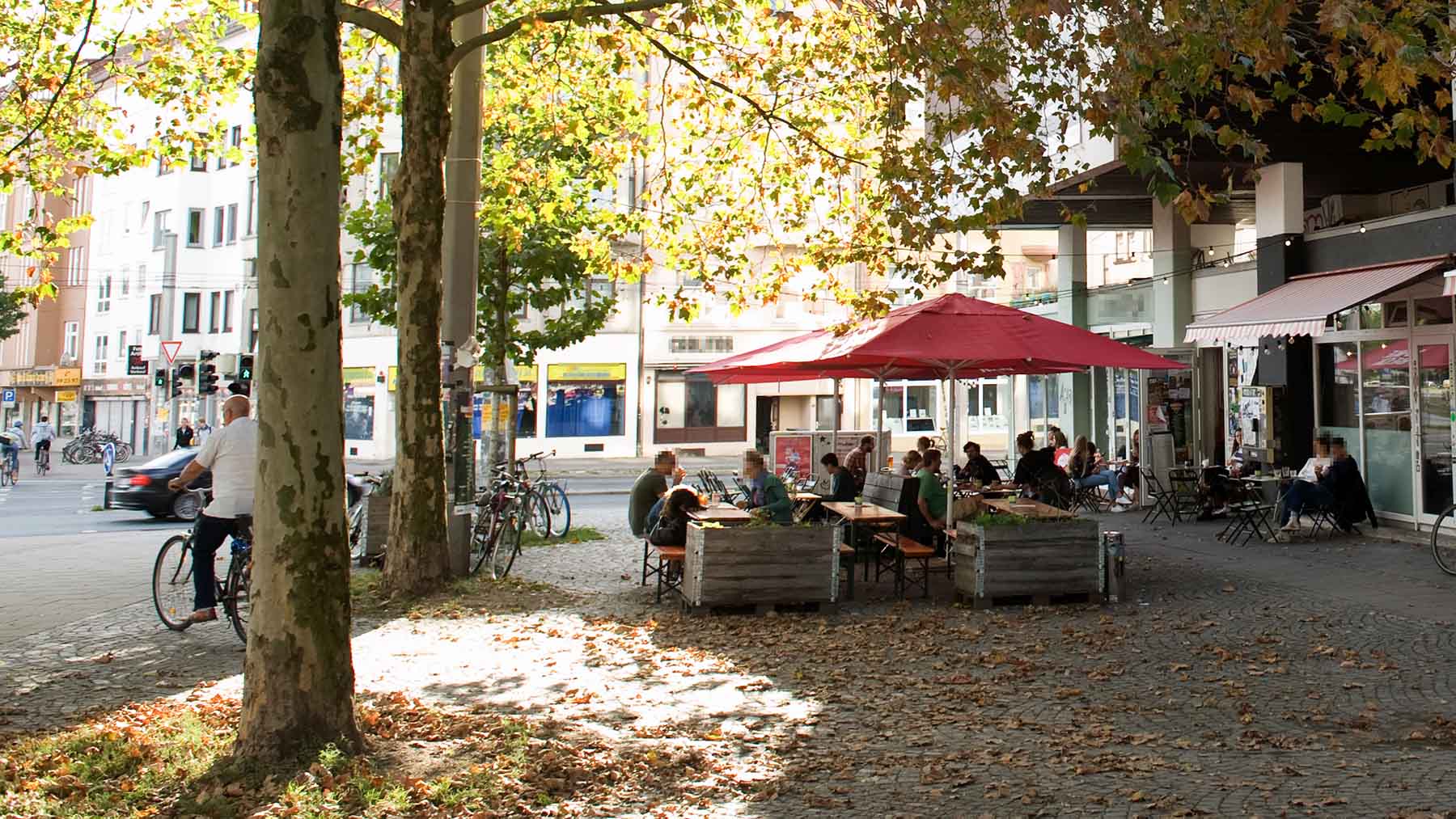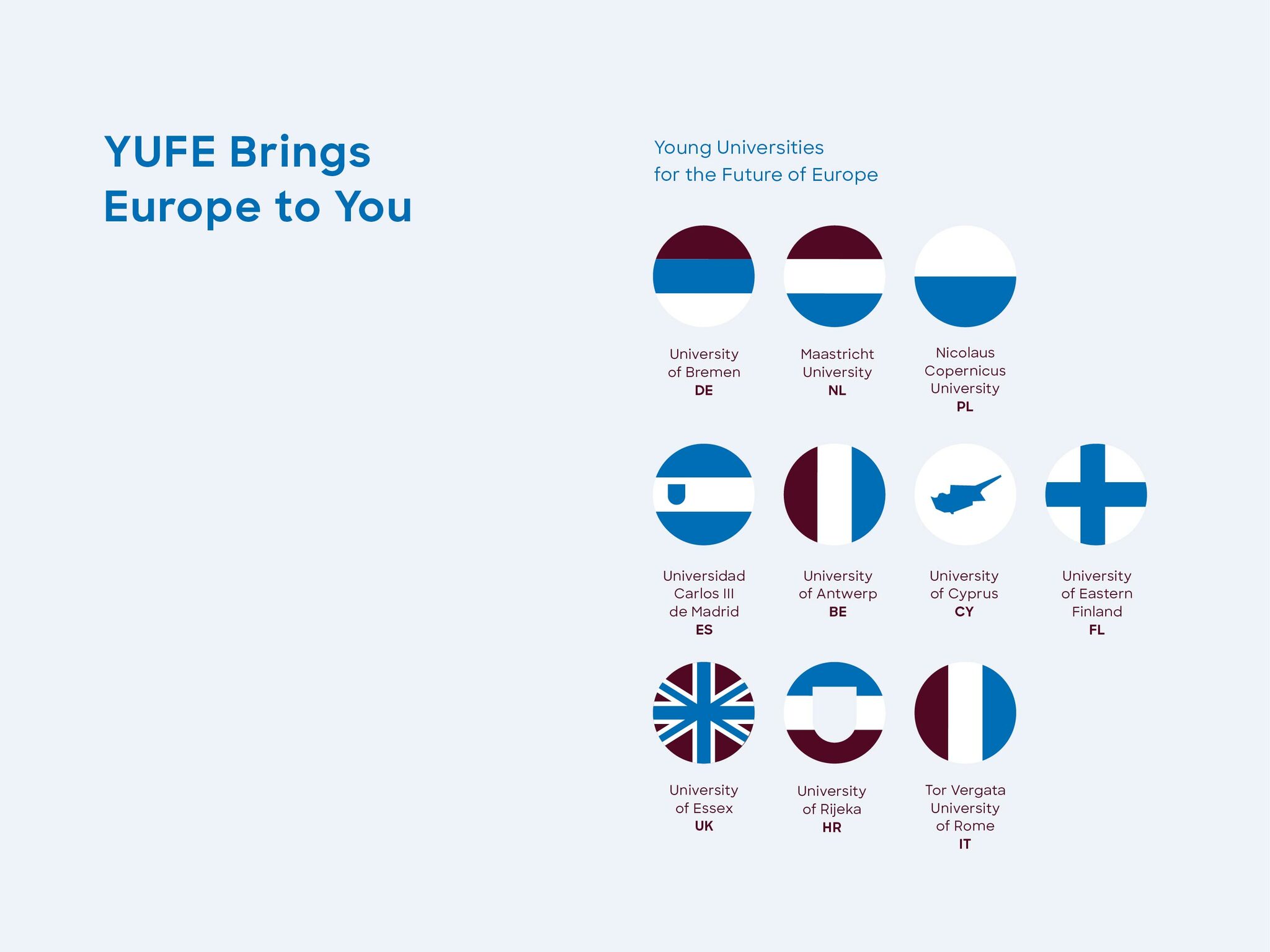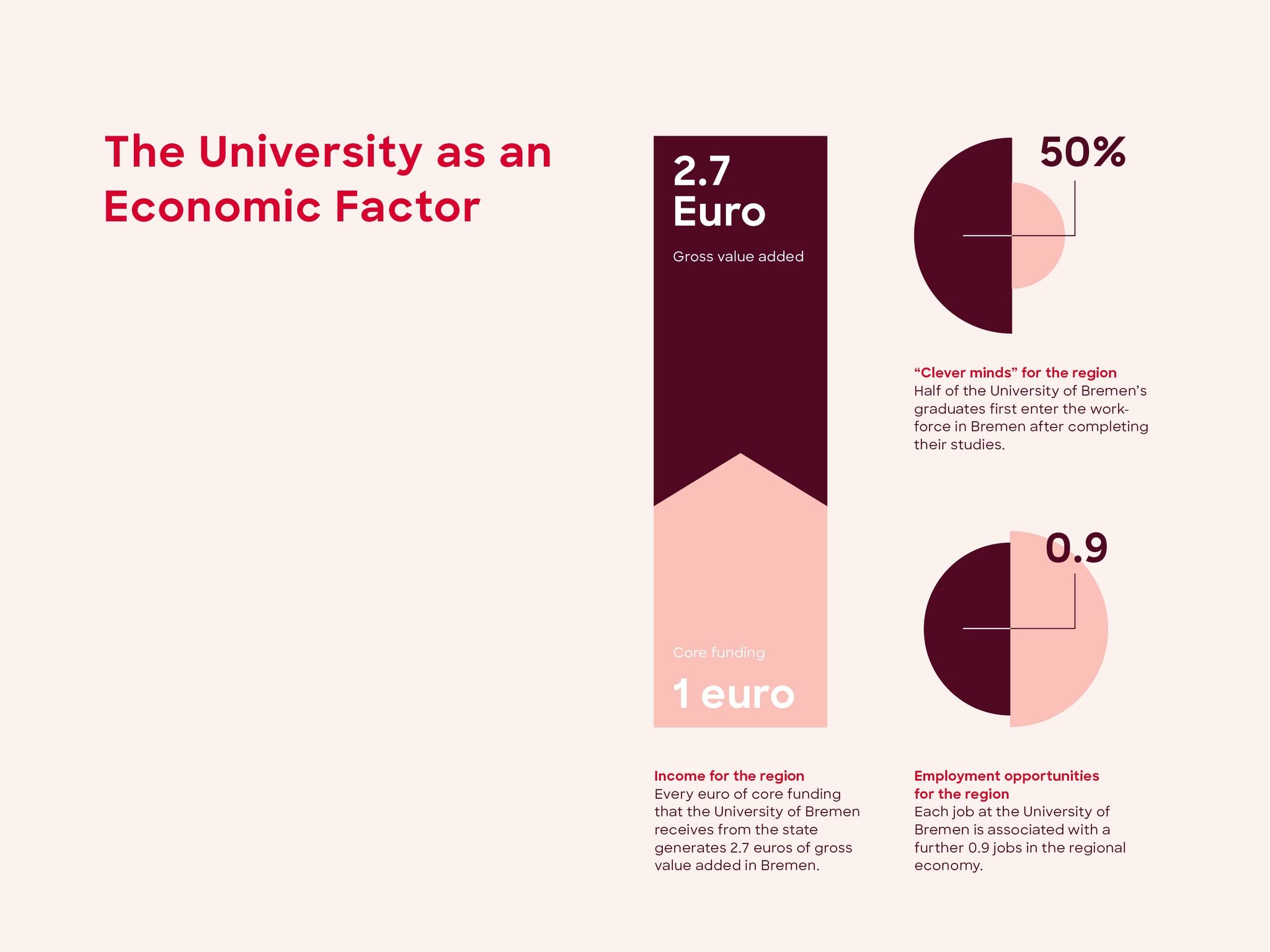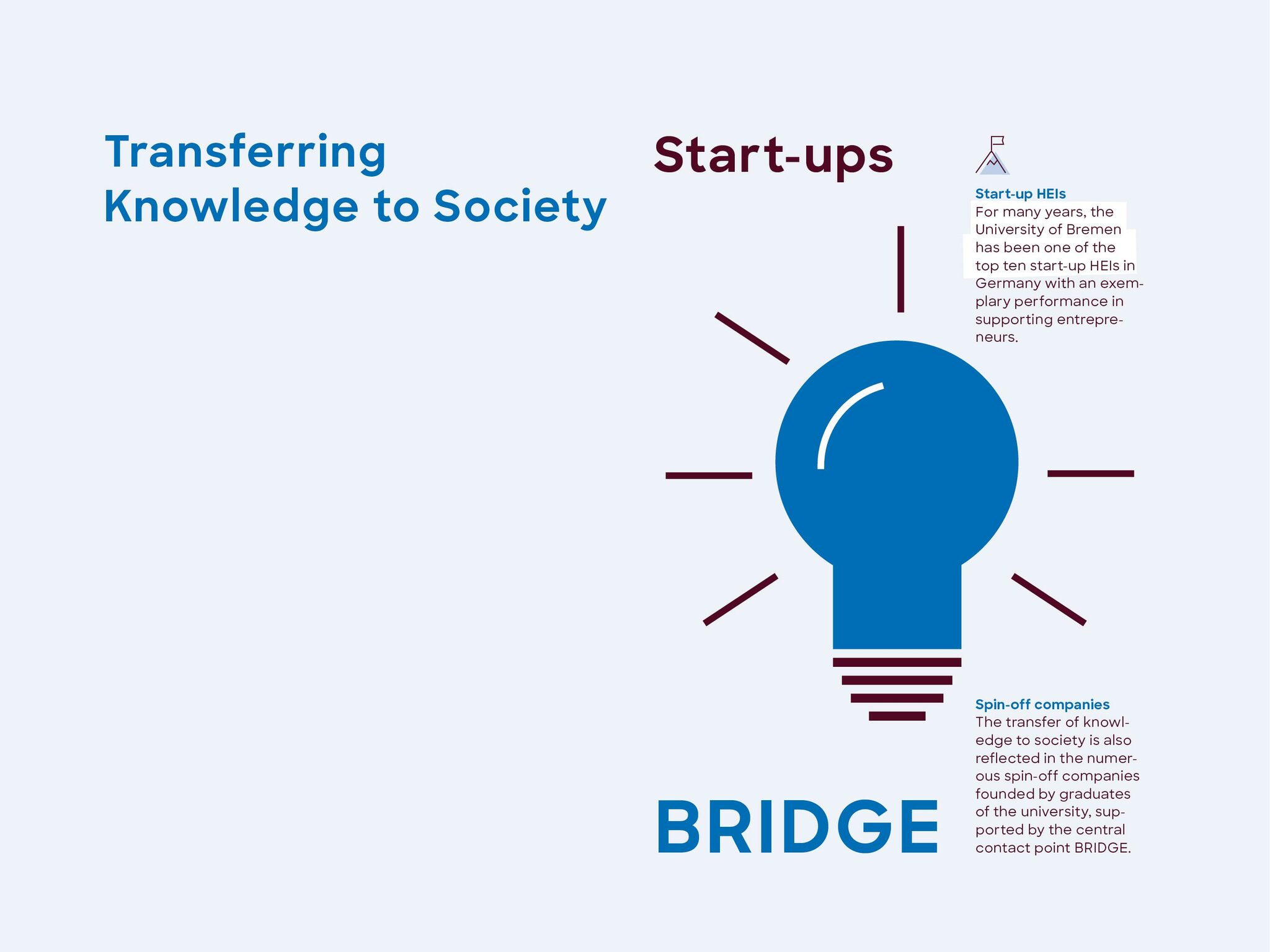
© Universität Bremen
University and Society
Facts and Figures about 50 Years of the University of Bremen. Part 4: University and Society.
The university of Bremen is turning 50 years old in 2021. Much has changed since 1971. To this day, however, hat retained what was distinguished it for five decades - it is open to everyone. We take a look back at the University of Bremen’s impressive evolution. Using facts and figures, we illustrate how a courageous reform project became one of Europe’s top research universities with more than 19,000 students in just five decades.
Since its founding, the University of Bremen has assumed responsibility for society at large and worked on pressing issues of the day.
It is a source of inspiration and a hotbed of ideas on economic and social issues. Its mission is to create knowledge and communicate it to society. As an important engine driving development in the region, it collaborates with major regional and international institutions. It plays a prominent role in the education of skilled workers. Its graduates make key contributions to the advancement of the business world and civil society. It is cosmopolitan and values an open and warm, welcoming environment.
Please note:
Because certain 2020 figures have been skewed by the coronavirus pandemic, the most recent data in some of the diagrams is from 2019.
Critical Minds
The students and faculty who came to the University of Bremen during the founding phase were young, critical, and eager for reforms. Open discussions, criticism, and creative protests continue to shape the university and the state of Bremen to this day, for example the Students for Future climate movement, which aims to make Fridays for Future’s cause more widely heard and calls on policymakers to implement tougher measures to combat climate change. In 2021, members of the university took a stand against looming statewide cuts to higher education funding.
United in protest: United in protest: In 2007, politicians presented University Development Plan V, which meant severe budget cuts and the elimination of degree courses for the university. On May 8, 2007, a large demonstration was held with 6,000 students, staff, and professors, as well as the University Executive Board.

The Climate University
The university is committed to climate and environmental research. In 2020, for example, it was the only German university among the founders of the International Universities Climate Alliance (IUCA) – a unique community of 35 universities that are leaders in climate research at the global level. Sustainability on campus is also important to the climate-minded university. For example, it covers all of its power requirements using green electricity.
The university produces its own climate-neutral electricity: in 2020, 360,000 kWh of green power were provided by six photovoltaic systems with over 700 kWp.

Website Universities for climate
A Welcoming and Cosmopolitan Environment
A welcoming, cosmopolitan environment has been part and parcel of the University of Bremen’s philosophy for many decades. In this context, it also offers protection to political refugees. In the midst of the Cold War, for example, the Research Centre for East European Studies at the University of Bremen was founded at the university as a safe haven for samizdat – literature banned by the state – from Eastern Europe. It was also an important point of contact for dissidents. Today, the FSO is a place where researchers come to terms with the Eastern Bloc and its societies with their specific culture, as well as analyze current developments in the post-Soviet region.

Website Research Centre for East European Studies
Bridges to the World
The University of Bremen enters into an agreement with Dickinson College in Pennsylvania, USA. It is one of the University of Bremen’s oldest partnership in the United States and the two institutions still have close ties today. The bright-red seating visible to everyone walking across campus is a testament to this extraordinary relationship – the Dickinson Chairs. Identical models are located on campus at Dickinson College.
The university has gained selected experts from all over the world for the U Bremen Excellence Chairs. These specially endowed visiting professors work closely with colleagues from the University of Bremen over a period of several years, conducting research on specific issues in the individual disciplines.

YUFE Brings Europe to You
The University of Bremen has retained its pioneering spirit and, nearly 50 years after its founding, it is creating one of the first European universities together with nine other universities and four nonacademic partners. Young Universities for the Future of Europe (YUFE) is committed to radical change in European higher education and aims to establish a young, non-elitist, open, and inclusive European university.

Website YUFE - Young Universities for the Future of Europe
The University as an Economic Factor
The University of Bremen is, first and foremost, a research institution. In addition, it is also an economic factor that has a particular impact on the city and state of Bremen and Germany’s northwest metropolitan region.

Transferring Knowledge to Society
Whether artificial intelligence, the coronavirus pandemic, or climate change, researchers and their expertise are in demand – in politics, in the media, in business, industry, and many other areas.
A current project that sees research and industry collaborating is DIGITAL HUB Industry. In this project, a place is being created in Technologiepark Bremen where industry and research work together on pressing issues of the day, such as artificial intelligence.

Website DIGITAL HUB INDUSTRY Bremen
Website BRIDGE
Well Connected in the Region
Excellence in Research on Display: U Bremen Research Alliance
Bremen is the German state with the highest density of national research institutions per capita. Within the framework of the U Bremen Research Alliance, the collaboration between the University of Bremen and 12 nonuniversity research institutes financed by the German federal and state governments is proudly put on display for the world to see.
Collaboration in all areas has been the university’s key to success for 50 years.
Short Distances, Clever Minds: Technologiepark Bremen
Bremen at the end of the 1980s: the shipbuilding and fishing industries are in a crisis. The university wants to stimulate new ideas and advocates for a technology park.
Landmark: The 146-meter-high Drop Tower operated by ZARM – Center of Applied Space Technology and Microgravity is a large laboratory unlike any other in Europe. It attracts international researchers who conduct free-fall experiments here.

A University for Everyone
“Why is the ocean salty?” was the opening lecture of the first Children’s University at the University of Bremen. Since then, researchers at the University of Bremen have been explaining to children what excites them about their field. Students can conduct independent research in laboratories on topics from the fields of mathematics, natural sciences, and engineering to space exploration and archaeology. The Children’s University mission is to get people interested in science at an early age.
Since 2019: the children’s book “Finja forscht” (“Finja Researches”) tells exciting stories from the University of Bremen. What is special about the book is that all the women scientists who appear as characters really exist.

Website Bremer Kinder-Uni
The University of Foundation
In 2009, the friends of the university (“unifreunde”) donated their foundation to the University of Bremen. Since then, the University of Bremen Foundation has more than quadrupled its capital. It now oversees five trust foundations. To date, the six foundations have together provided 360,000 euros for scientific projects. Since 2011, the German government’s Deutschlandstipendium program has been one of the projects it supports. Together with other foundations, companies, and private individuals, they have made scholarships available to more than 1,100 talented students over the past ten years.

Website Deutschlandstipendiat
Important Ambassadors
The University of Bremen considers alumni to be important partners. They include world-class researchers, experts, and executives from across the globe. In 2015, the university launched its Research Ambassadors program. They serve as important ambassadors for the University of Bremen worldwide and promote the university and the research work carried out here.

Website Alumni der Universität Bremen e.V.
More Information
More facts and figures wanted? Have a look in the Yearbook
Check out our website 50 Years of the University of Bremen